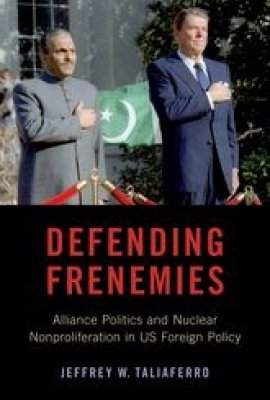Jeffrey Taliaferro
Former Fellow
Professional Affiliation
Professor of Political Science, Tufts University
Expert Bio
Jeffrey W. Taliaferro is professor of political science at Tufts University. His research and teaching focus on security studies, international relations theory, international history and politics, intelligence and US national security, and cybersecurity and policy. Taliaferro is the author of Defending Frenemies: Alliance Politics and Nuclear Nonproliferation in US Foreign Policy (Oxford University Press, 2019); and of Balancing Risks: Great Power Intervention in the Periphery (Cornell University Press, 2004), which won the American Political Science Association's Robert L. Jervis and Paul W. Schroeder Award for the Best Book in International History and Politics. He is the co-author, with Norrin M. Ripsman and Steven E. Lobell, of Neoclassical Realist Theory of International Politics (Oxford University Press, 2016). He is also co-editor, with Lobell and Ripsman, of Neoclassical Realism, the State, and Foreign Policy (Cambridge University Press, 2009) and of The Challenge of Grand Strategy: The Great Powers and the Broken Balance between the World Wars (Cambridge University Press, 2012).
http://as.tufts.edu/politicalscience/people/faculty/taliaferro
Wilson Center Project
The Best of Frenemies: Politics of Intra-Alliance Coercion in U.S. Foreign Policy
Project Summary
This book examines how the United States has bargained with strategically vulnerable and often obstreperous allies in three volatile regions of the globe—the Middle East, South Asia, and East Asia from the 1960s to the 1990s. It presents a historical and comparative analysis of the how successive US presidential administrations—Dwight D. Eisenhower through George H.W. Bush—employed both inducements and coercive diplomacy in dealings with Israel, Pakistan, the Republic of Korea, and Taiwan over nuclear weapons proliferation. Policymakers’ assessments of regional threats to US interests, as moderated by the ease or difficulty of mobilizing congressional support, determined whether the United States pursued accommodative or coercive nonproliferation strategies toward each country. Drawing upon recently declassified documents, the book reexamines these historic nonproliferation disputes between Washington and four allies. It draws implications for current US alliance management and nonproliferation strategies.
Major Publications
Defending Frenemies: Alliance Politics and Nuclear Nonproliferation in US Foreign Policy (New York: Oxford University Press, 2019)
Previous Terms
Program Affiliation: International Security Studies
Insight & Analysis by Jeffrey Taliaferro
- Book
- US Foreign Policy
Defending Frenemies: Alliances, Politics, and Nuclear Nonproliferation in US Foreign Policy


